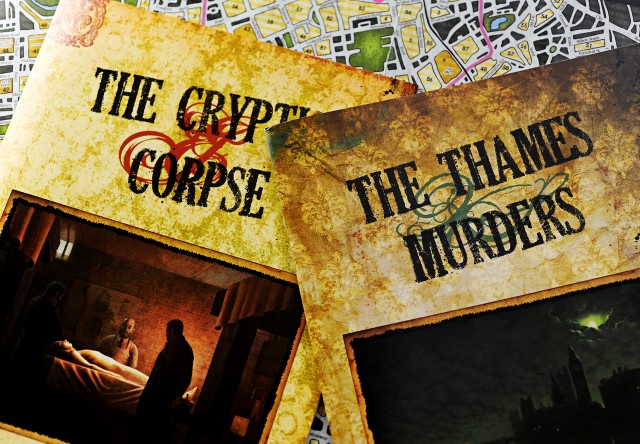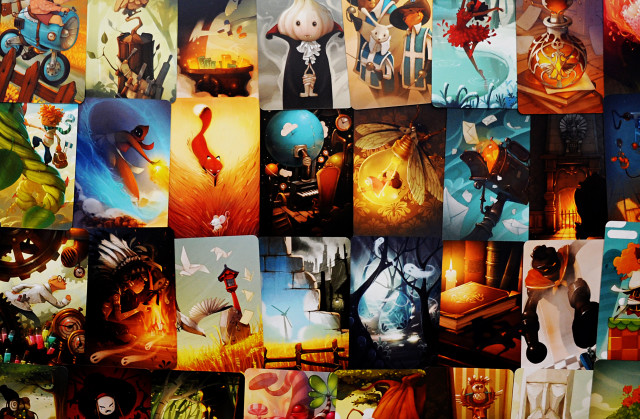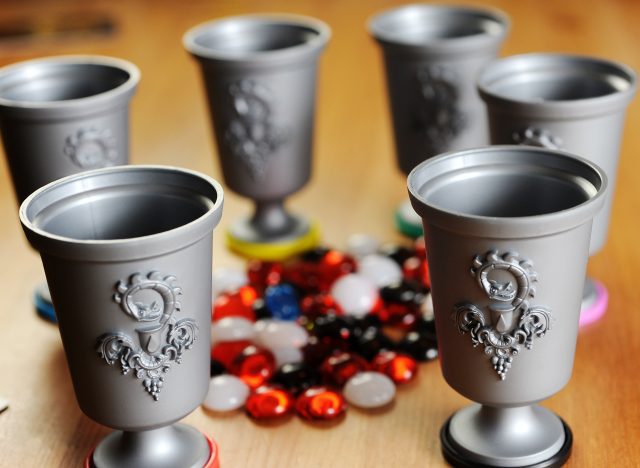Board games are a great connector for families. In our digital age, it can be a monumental task to put down our screens for a little while and form tangible, tactile bonds between other humans in the same room. Getting games to the table gives us a chance to focus on the analog pleasures of setting up a Mediterranean trade route, or conquering an opponent’s territory, or finishing the race before anyone else. Games provide the kind of social setting where conversations can begin, memories can be made, and relationships can flourish. Games are great teachers, and can help little ones to learn when to work together, and when to take losing like a champ. Here are five games we think are perfect fits for your next family game night.
 When I first tried Miniscule by Bombyx and Asmodee, I wasn’t blown away by it, but the more times I played it, the more it’s been raised in my esteem. It is the day of the big bug race and players are hoping their bugs finish at the front of the pack. Everyone is dealt out two secret bug cards. These are the crawling (or flying) critters you want to win the race. There are two of every bug, so you may end up with the same bug twice, or more likely, a different player will secretly share the same goal with you. Over the course of the game, players use action cards to move the bugs as they jostle for position. Cards will allow you to move whichever bug is on a specific position, or move a specific bug. The trick is that you have to play every card, even if it means making a move that’s not helpful to you. Miniscule is very easy to learn and a heck of a lot of fun to play. With room for up to six racers, it can get a bit chaotic, but the rounds are so quick and the stakes are kept low and fun. It’s a great introduction to strategy for new gamers, and an addictive lark for people who have been playing for a long time.
When I first tried Miniscule by Bombyx and Asmodee, I wasn’t blown away by it, but the more times I played it, the more it’s been raised in my esteem. It is the day of the big bug race and players are hoping their bugs finish at the front of the pack. Everyone is dealt out two secret bug cards. These are the crawling (or flying) critters you want to win the race. There are two of every bug, so you may end up with the same bug twice, or more likely, a different player will secretly share the same goal with you. Over the course of the game, players use action cards to move the bugs as they jostle for position. Cards will allow you to move whichever bug is on a specific position, or move a specific bug. The trick is that you have to play every card, even if it means making a move that’s not helpful to you. Miniscule is very easy to learn and a heck of a lot of fun to play. With room for up to six racers, it can get a bit chaotic, but the rounds are so quick and the stakes are kept low and fun. It’s a great introduction to strategy for new gamers, and an addictive lark for people who have been playing for a long time.
 Kids love a good story, and Sherlock Holmes: Consulting Detective masterly weaves one (or many). The base game contains ten different cases to work your way through. Each one is truly engaging, and will take real powers of deduction and observation to get to the core of them. Players work together travelling to different locations around London talking to witnesses, suspects, law enforcement, and anyone else who could conceivably be involved in a crime. Newspapers can be scoured to come up with clues, and like with any good case, it’s helpful to have a team of people to bounce ideas off of. SHCD takes some patience and discipline. You may be tempted to follow some red herrings along the way, but keep the team grounded and you’ll be in good position to answer the questions at the end of the case. There is indeed a score you can give yourselves for your performance, but in my play throughs, I generally ignore that and focus on the fun of solving the case.
Kids love a good story, and Sherlock Holmes: Consulting Detective masterly weaves one (or many). The base game contains ten different cases to work your way through. Each one is truly engaging, and will take real powers of deduction and observation to get to the core of them. Players work together travelling to different locations around London talking to witnesses, suspects, law enforcement, and anyone else who could conceivably be involved in a crime. Newspapers can be scoured to come up with clues, and like with any good case, it’s helpful to have a team of people to bounce ideas off of. SHCD takes some patience and discipline. You may be tempted to follow some red herrings along the way, but keep the team grounded and you’ll be in good position to answer the questions at the end of the case. There is indeed a score you can give yourselves for your performance, but in my play throughs, I generally ignore that and focus on the fun of solving the case.
 You really can’t wrong with one of these cooperative classics by Matt Leacock. They are perfect introductions to the concept of working together on the same team for younger players. Island is certainly the easier of the two. In it, players are trying to find four ancient artifacts, before the unstable rock they’ve landed on sinks into the sea. It shares some of the mechanical ideas of Leacock’s Pandemic, with players having their own special abilities and needing to collect cards to acquire the artefacts. It all culminates with a wild dash for the copter before the island disappears forever. In Desert, players have crash landed in an ancient city in the middle of a sea of sand, and their only hope of survival is finding the parts of an mysterious flying machine. Desert ups the difficulty considerably, with players having to contend with shifting sand dunes and crippling heat. At some of the higher difficulty levels, Desert can feel like you’re just treading water (except you have none). Both games are easy to learn and have a high replay value. You’ll find yourselves resetting them again and again, with hope against hope for successful runs.
You really can’t wrong with one of these cooperative classics by Matt Leacock. They are perfect introductions to the concept of working together on the same team for younger players. Island is certainly the easier of the two. In it, players are trying to find four ancient artifacts, before the unstable rock they’ve landed on sinks into the sea. It shares some of the mechanical ideas of Leacock’s Pandemic, with players having their own special abilities and needing to collect cards to acquire the artefacts. It all culminates with a wild dash for the copter before the island disappears forever. In Desert, players have crash landed in an ancient city in the middle of a sea of sand, and their only hope of survival is finding the parts of an mysterious flying machine. Desert ups the difficulty considerably, with players having to contend with shifting sand dunes and crippling heat. At some of the higher difficulty levels, Desert can feel like you’re just treading water (except you have none). Both games are easy to learn and have a high replay value. You’ll find yourselves resetting them again and again, with hope against hope for successful runs.
 I remember being thoroughly enchanted with this game the first time I played it. It’s a communication game, that challenges the way we think about and perceive images. In Dixit, players have hands of beautifully illustrated cards, each one telling its own story. On a turn, the active player will say something about one of their cards. It can be a phrase, a word, or even just a sound. Based on what they say, all the other players will secretly select a card from their own hands as decoys. All the cards are shuffled together and then laid out. Players will vote on which they think the actual card is. The trick for the storyteller is, to get some, but not all of the other players to guess their card. If everyone or no one gets it right, they score nothing. If players manage to fool people with their decoys, they’ll score points for that too. Dixit is a game that will stretch the bounds of players’ imagination and creativity. It is definitely beneficial to know the people you’re playing with, as it goes a long way towards understanding their thinking. However, at the end of the day, Dixit does what most great family game do, which is keep the scoring at a low level of importance. This one is definitely about the journey you’ll go on.
I remember being thoroughly enchanted with this game the first time I played it. It’s a communication game, that challenges the way we think about and perceive images. In Dixit, players have hands of beautifully illustrated cards, each one telling its own story. On a turn, the active player will say something about one of their cards. It can be a phrase, a word, or even just a sound. Based on what they say, all the other players will secretly select a card from their own hands as decoys. All the cards are shuffled together and then laid out. Players will vote on which they think the actual card is. The trick for the storyteller is, to get some, but not all of the other players to guess their card. If everyone or no one gets it right, they score nothing. If players manage to fool people with their decoys, they’ll score points for that too. Dixit is a game that will stretch the bounds of players’ imagination and creativity. It is definitely beneficial to know the people you’re playing with, as it goes a long way towards understanding their thinking. However, at the end of the day, Dixit does what most great family game do, which is keep the scoring at a low level of importance. This one is definitely about the journey you’ll go on.
 You love your family, we know. But sometimes, couldn’t ya just kill em? Raise Your Goblets provides a safe and cathartic alternative to murder. Players take on the role of Nobles vying to become the next ruler of Otravia, despite the regularity of regicide. Each player gets a goblet, a supply of wine, poison, and antidote, a character card, and a target. Each turn, players spend actions secretly pouring something into goblets, rotating or swapping goblets, or peeking at what’s in their own goblet. When they’re feeling confident (and they’ve spent all their wine tokens), they can call a toast. Everyone gets one last action and then drinks the contents of the goblet in front of them. The main goal of, course is to live, which you do by having as much or more antidote than poison in your goblet. You also want to kill your target and have the most wine. Each of those outcomes will earn you points. After three courses, the player who has acquired the most points will be come king, y’know, until the next dinner party. Character cards introduce some special powers which can play with the rules of the game. Raise Your Goblets is a light, fun and fast game, that all members of the family can enjoy. Even if you kill them.
You love your family, we know. But sometimes, couldn’t ya just kill em? Raise Your Goblets provides a safe and cathartic alternative to murder. Players take on the role of Nobles vying to become the next ruler of Otravia, despite the regularity of regicide. Each player gets a goblet, a supply of wine, poison, and antidote, a character card, and a target. Each turn, players spend actions secretly pouring something into goblets, rotating or swapping goblets, or peeking at what’s in their own goblet. When they’re feeling confident (and they’ve spent all their wine tokens), they can call a toast. Everyone gets one last action and then drinks the contents of the goblet in front of them. The main goal of, course is to live, which you do by having as much or more antidote than poison in your goblet. You also want to kill your target and have the most wine. Each of those outcomes will earn you points. After three courses, the player who has acquired the most points will be come king, y’know, until the next dinner party. Character cards introduce some special powers which can play with the rules of the game. Raise Your Goblets is a light, fun and fast game, that all members of the family can enjoy. Even if you kill them.
Comments
No comments yet! Be the first!